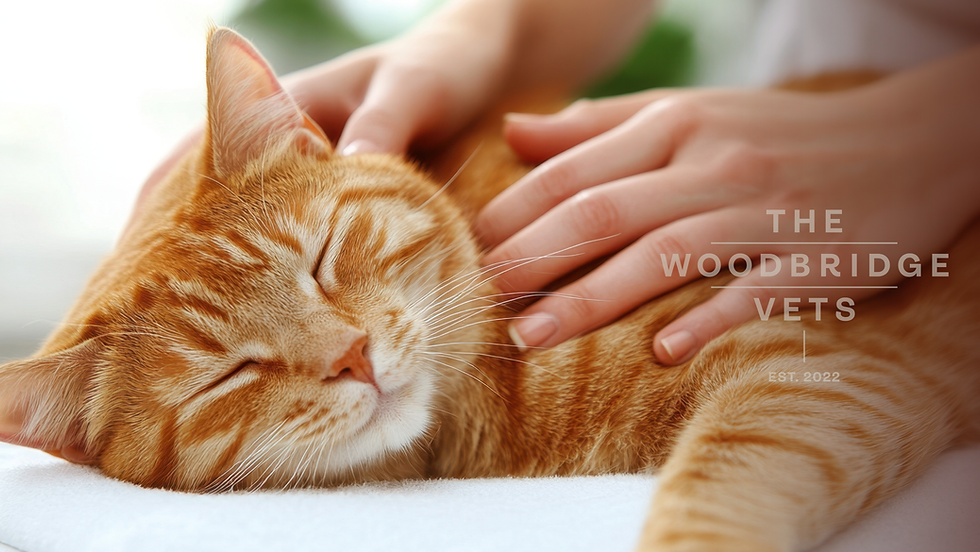FIRST AID FOR YOUR PET
- The Woodbridge Vets
- Feb 17, 2022
- 3 min read
Updated: Mar 4, 2025
Unfortunately there may be occasions when your pet will need some first aid before you get to a vet. Below we highlight the most common situations you may encounter, and it pays to be well prepared.

Minor cuts and abrasions
We are lucky to live in Suffolk with its heathlands and forests, but this landscape can be full of brambles, sharp sticks and barbed wire. Most superficial injuries (that don't break the skin) should be washed gently with clean running water to remove dirt from the wound. The wound should be dried with clean paper towel, avoid cotton wool or fabric towels as these can leave fibres in the wound. For superficial wounds a topical antiseptic cream can be applied but its best to check with a professional for the suitability of any cream you have to check its safe to use . If your pet can get to the wound then a barrier such as a vest, bandage, or an Elizabethan collar if you have one. If the wound is not starting to heal within 2 days, or there is discharge we would advise you seek a professional opinion.
Severe wounds and lacerations
These wounds are likely to require professional attention immediately so the goal here is to prevent the injury from getting worse rather than treating it yourself. Bleeding from a wound can result in significant blood loss so firstly it will be necessary to get your dog under control. Keeping your dog calm reduces blood pressure to reduced bleeding. Most small wounds will stop bleeding once pressure has been applied for 5 minutes. If you are far from help then it is best to sit with your pet putting manual pressure over the wound, don't keep checking the wound simply continue to apply pressure to the wound. Then return to your car once the bleeding has stopped. If the bleeding is severe then pressure should be applied constantly using whatever items or help you may have at your disposal. Having a first aid kit with a bandage will be a real help, most cars have one in the boot. The use of a tourniquet is not encouraged as if incorrectly applied it may cause more harm than good. Continuous direct pressure is best. Call us at the earliest possible time and arrange as swift an arrival as you can.

Adder bites
In the warmer months Adder bites are a common issue, especially in heathland areas. To reduce toxins spreading it is best to limit activity and carrying the pet if possible. Prevent the pet from licking the wound by covering it. Veterinary assistance must be sought swiftly, so we can give the required treatment which depends on the location and severity of the bite, we have access to viper anti-venom if this is needed.
Poison ingestion
If you think your pet has ingested a poison, you should seek veterinary advice immediately. Evidence of the ingredients provides very useful information. We have access to the worlds largest poison database, this allows us to make the right decisions for your pet including the best treatment needed for the specific poison. Acting promptly is very important as if we need to make your pet sick we need to do this as soon as possible to reduced absorption of the toxins. The most common toxins we see are grapes, chocolate, rodent poison and artificial sweeteners.

Insect Stings
These normally will present as a painful reaction with swelling around the muzzle or face but can occur on the limbs and feet. If you know or think a sting has happened then you need to monitor your pet’s breathing carefully as swelling to the airway can be a serious complication. Contact a vet to advise on the best treatment as the use of antihistamines is often needed but not all human antihistamine treatments are safe for pets. A cold compress of ice or a bag of frozen peas can be placed on the painful area to alleviate pain and also reduce swelling. If the condition does not improve, pain is severe or the sting occurred in the mouth or face then contact a vet.
If you have any concerns about your pet its best to contact a vet for professional advise at the earliest opportunity. Prompt proactive treatment gives the best outcomes.




Comments